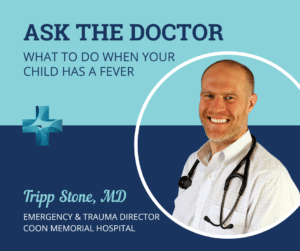Hello Dalhart,
 As we continue to slug our way through the winter season, many parents are facing the unfortunate task of caring for a sick child. Coughing, runny nose, sore throat, and fever among other things can be distressing to both the child and parents alike. While fevers can be scary, there is rarely an instance to worry about the magnitude of fever and the subsequent safety of your child. I would like to share with you a helpful webpage created by Seattle Children’s Hospital (a nationally ranked pediatric center in the United States) that discusses myths vs. facts regarding fevers. You can view that here: https://www.seattlechildrens.org/…/fever-myths-versus…
As we continue to slug our way through the winter season, many parents are facing the unfortunate task of caring for a sick child. Coughing, runny nose, sore throat, and fever among other things can be distressing to both the child and parents alike. While fevers can be scary, there is rarely an instance to worry about the magnitude of fever and the subsequent safety of your child. I would like to share with you a helpful webpage created by Seattle Children’s Hospital (a nationally ranked pediatric center in the United States) that discusses myths vs. facts regarding fevers. You can view that here: https://www.seattlechildrens.org/…/fever-myths-versus…
I hope you find this resource both helpful and reassuring. Acetaminophen (Tylenol) and Ibuprofen (motrin, advil) are GREAT medications to help reduce fever. Again, while the fever itself is not harmful (except in certain circumstances), these medications can help keep the child comfortable, allow for better sleep, and often reduce the heart rate. Generally, low-grade fevers (below 102 °F) should not be treated with Tylenol or ibuprofen because they are probably helpful in fighting the infection and usually not too uncomfortable. Rather than worry about exactly how high the temperature is it may be more useful to ask “how is my child behaving?” For example, a child who is eating and drinking normally, playing happily, and sleeping comfortably while running a temperature of 104°F is less concerning. On the other hand, a child with any fever who is crying with a headache, refusing to eat and drink, and does not want to do anything but lie around should probably be treated with some Tylenol or ibuprofen. High fevers of 105°F or higher should be evaluated by your PCP because fevers this high could indicate additional concerns.
Please follow up with your primary care physician if you have any further questions.
Best of luck this winter season,
Dr. Stone
If you would like to hear from our doctors on a specific topic, please email heydoc@dhchd.org.
